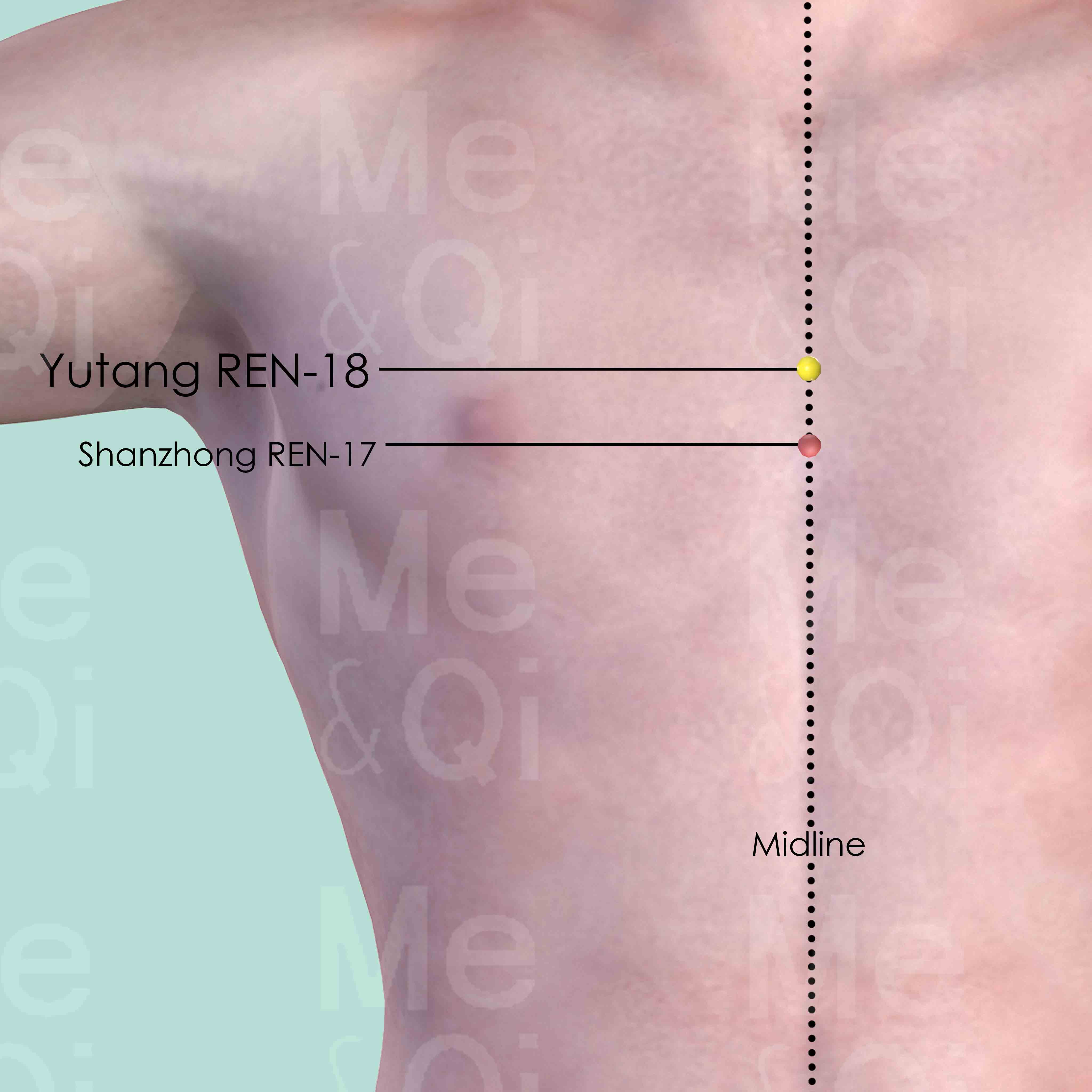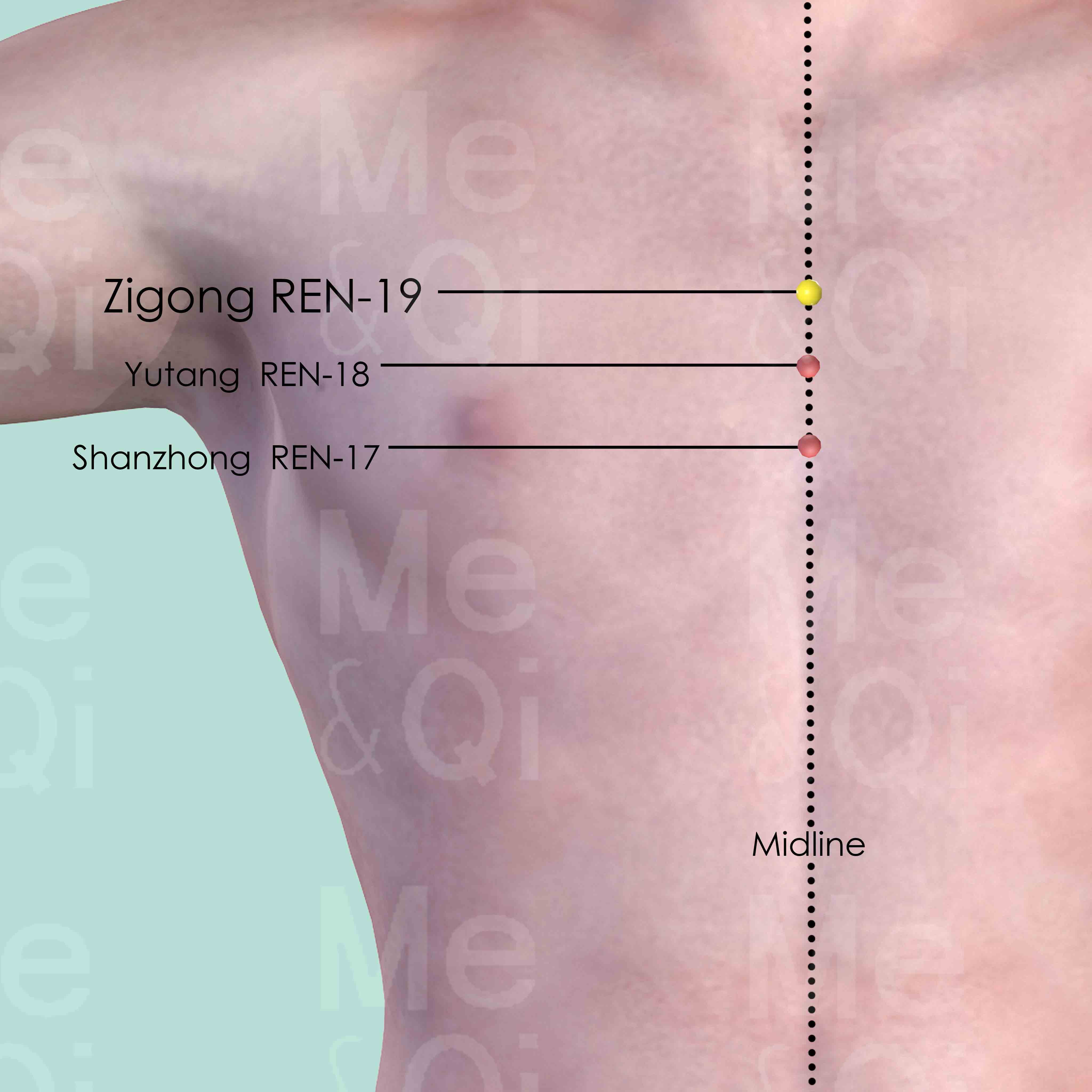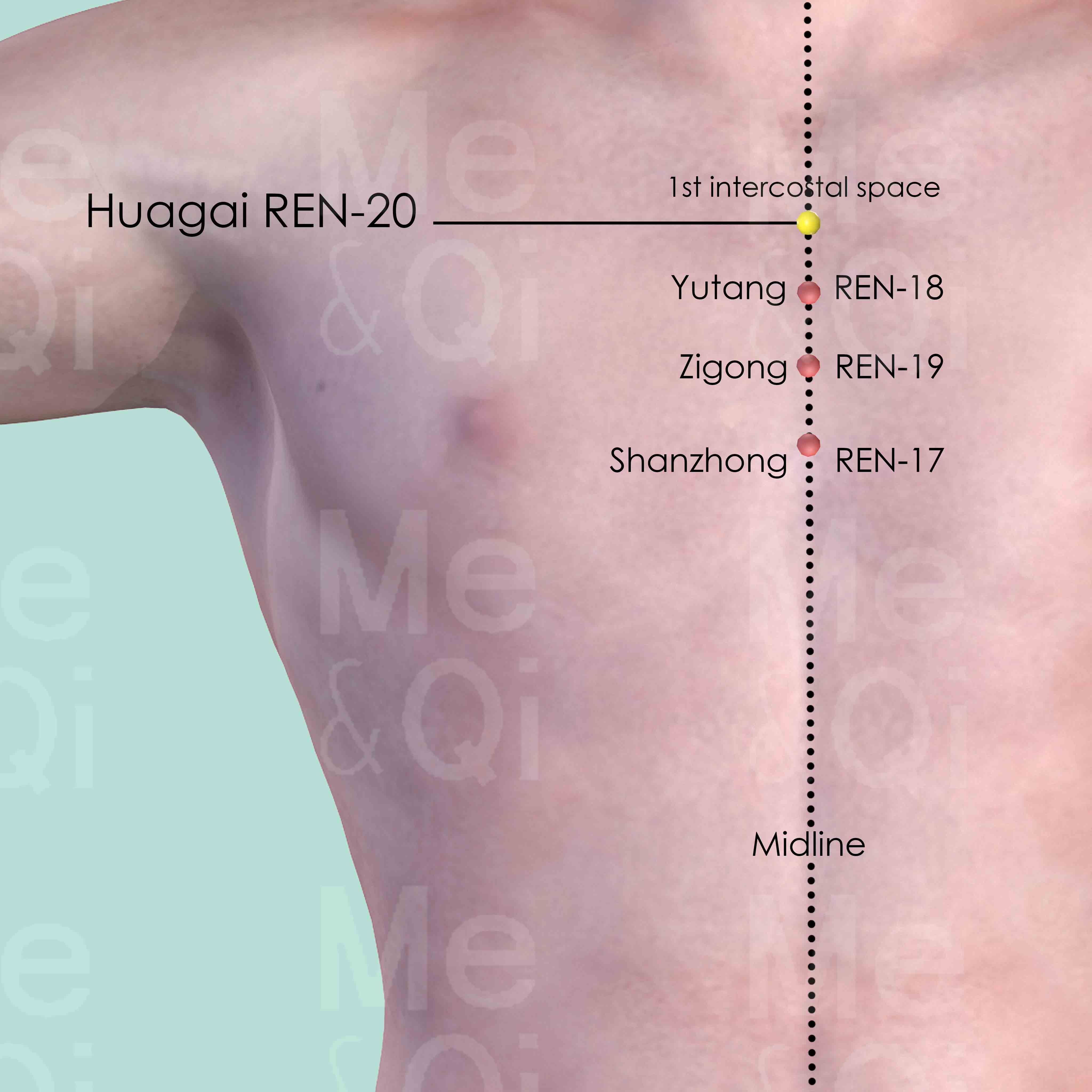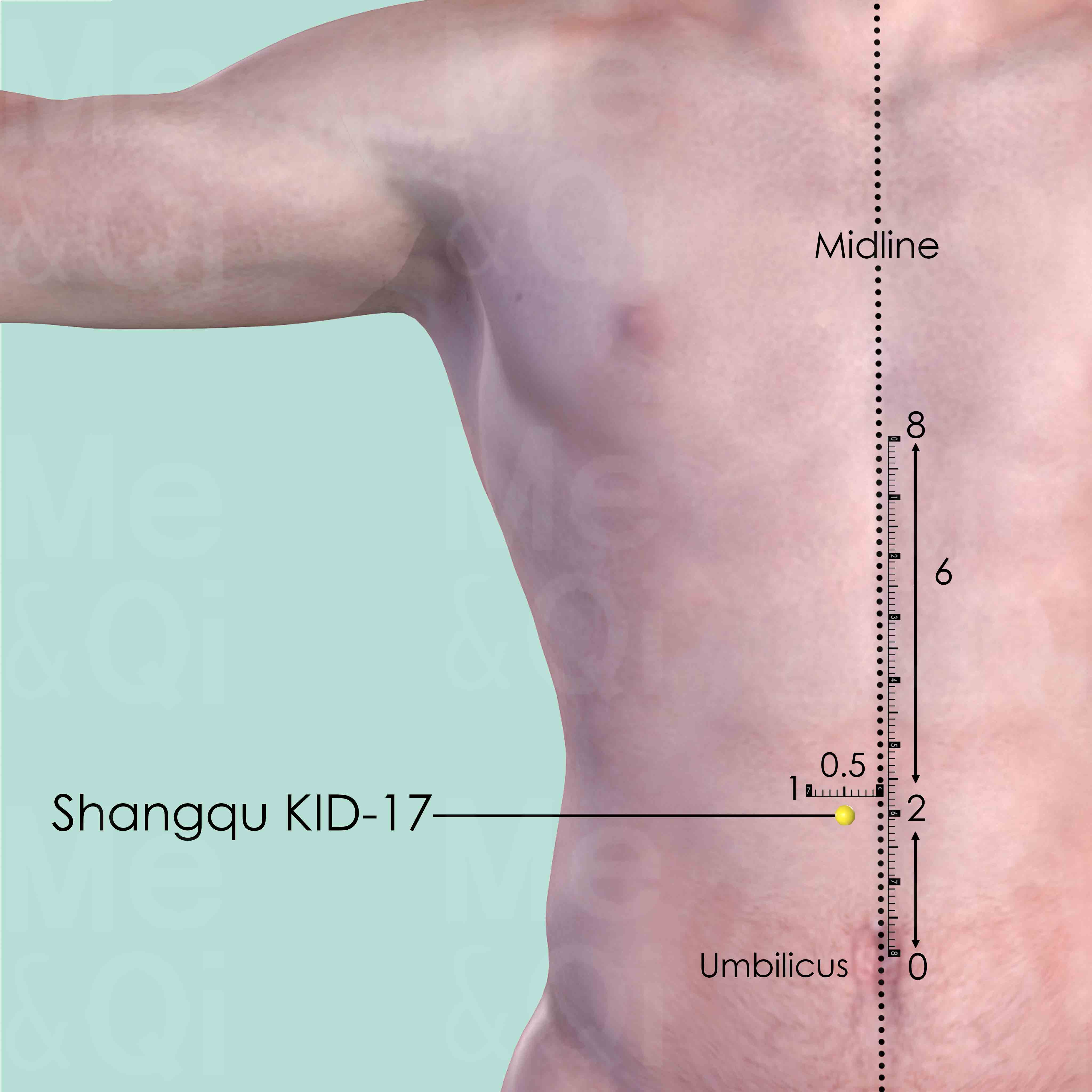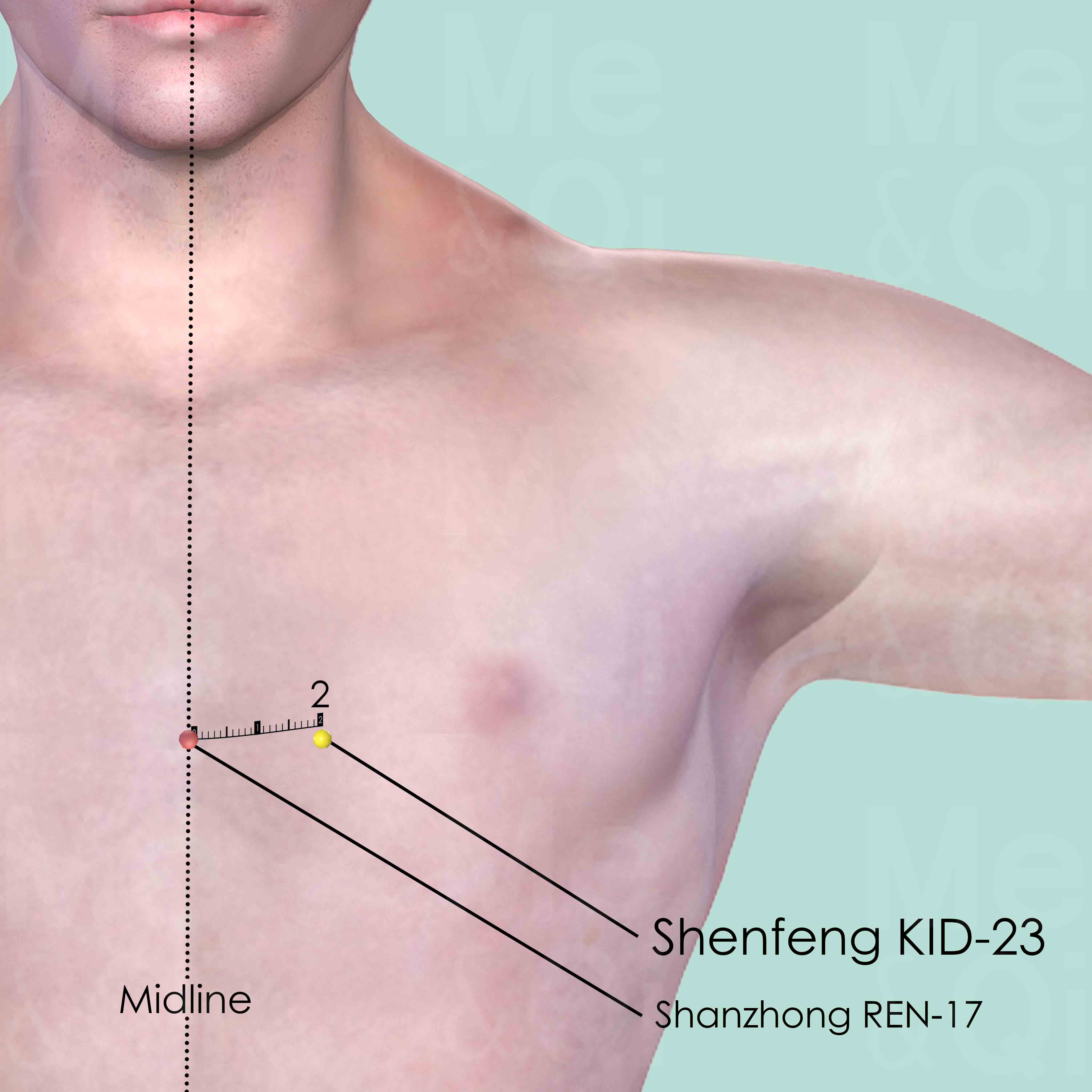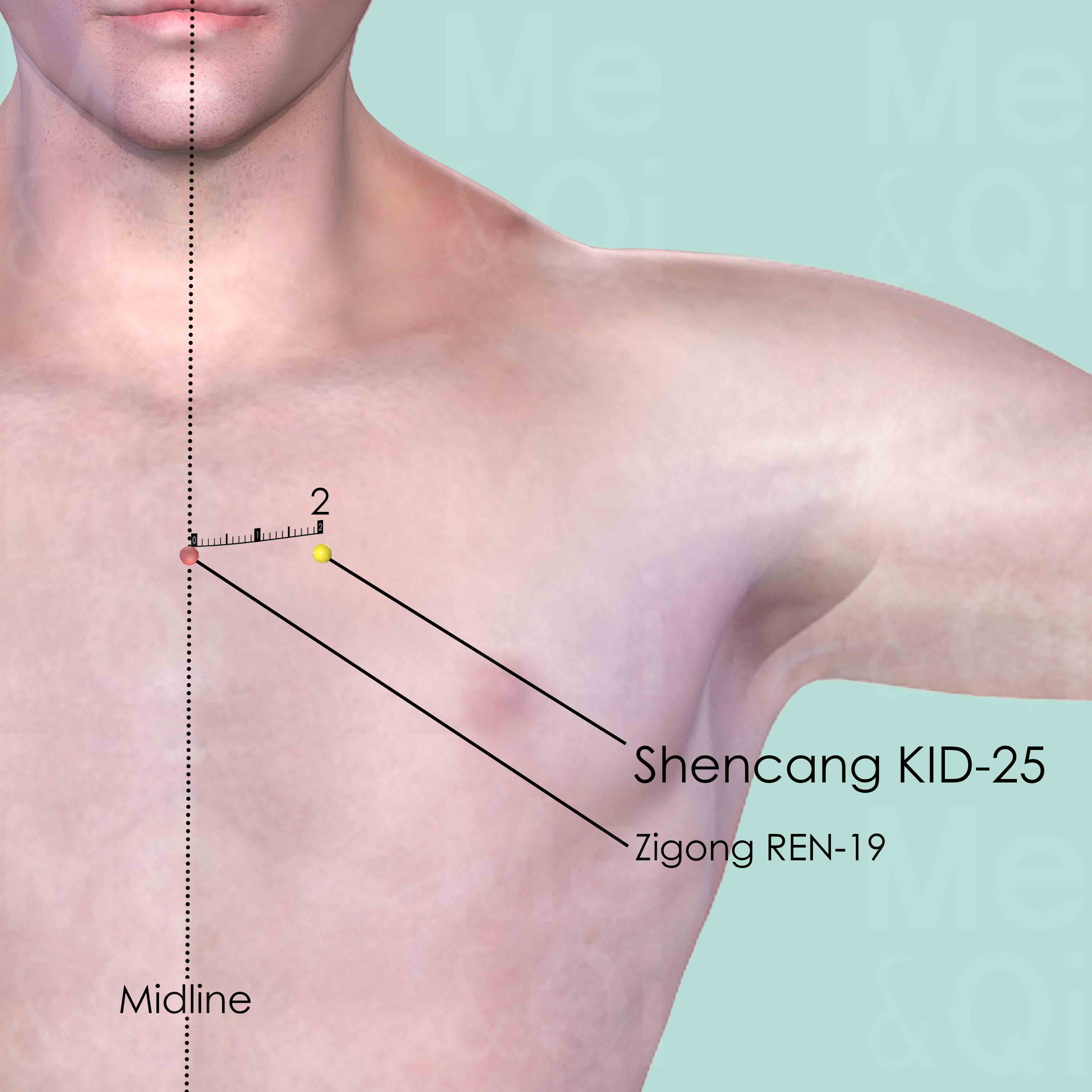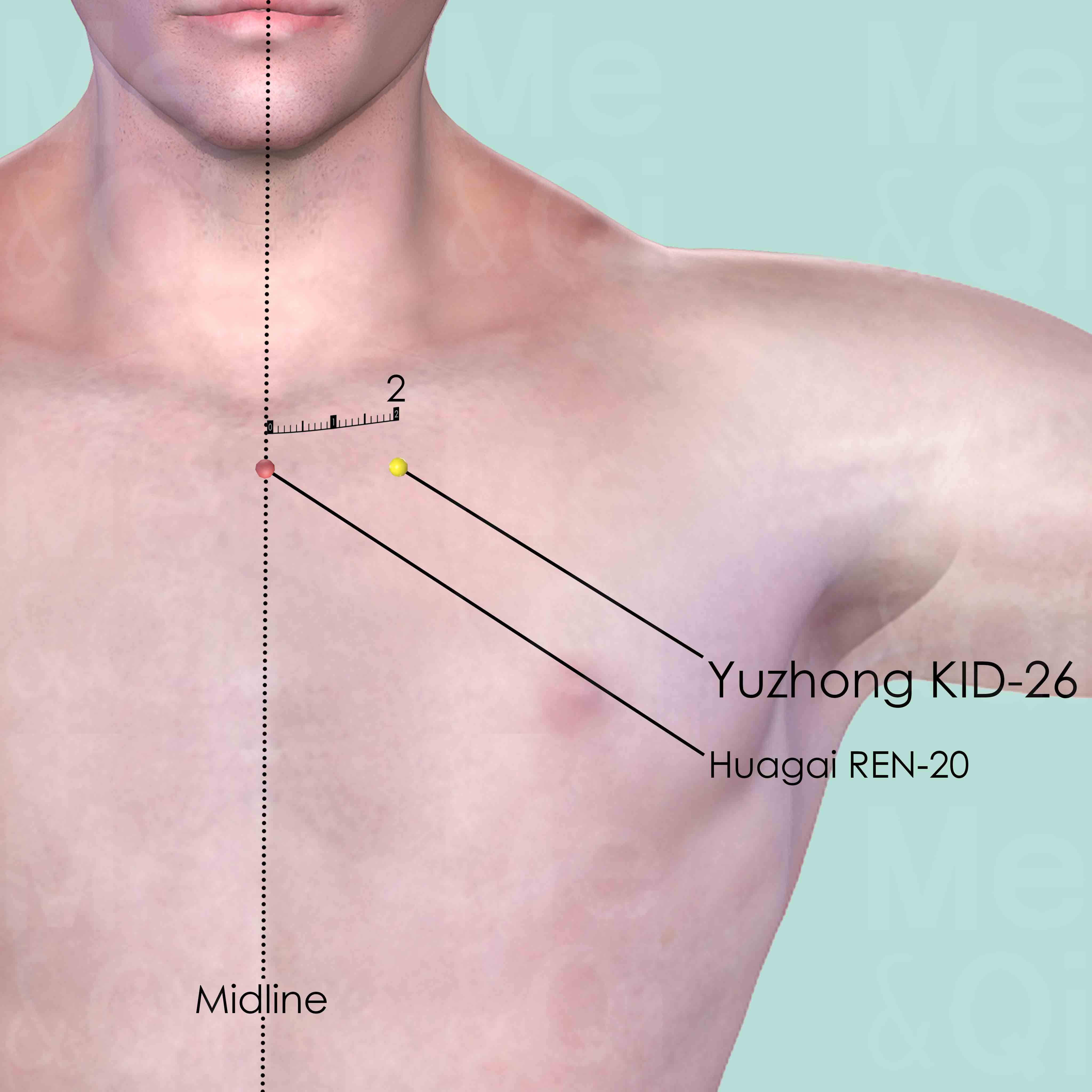Dysphagiaaccording to TCM
Symptom family: Swallowing Difficulties
What is Dysphagia?
Dysphagia, in medical terms, refers to the difficulty in swallowing. It involves a sensation of hindrance or discomfort when food or liquids are passing from the mouth down into the stomach. This condition can affect individuals of all ages and may stem from various causes such as neurological disorders, muscular diseases, or structural abnormalities. Dysphagia not only makes eating and drinking a challenge but also poses risks like choking or aspiration, which can lead to more severe health complications.
How does TCM view Dysphagia?
Traditional Chinese Medicine (TCM) offers a unique perspective on dysphagia, distinct from the approach of Western medicine. In TCM, dysphagia is seen as a symptom arising from imbalances or disharmonies within the body's energy system.
This view holds that a variety of underlying patterns could manifest as dysphagia, emphasizing the importance of individualized diagnosis. TCM stresses the identification of the specific pattern causing the symptom, as each pattern requires a tailored treatment approach.
Root Causes of Dysphagia in TCM
In TCM, dysphagia is often attributed to specific imbalances within the body. One such cause is the accumulation of Qi-Phlegm, where the body's vital energy, or Qi, is obstructed by Phlegm, leading to symptoms like difficulty swallowing, a sensation of a lump in the throat, and emotional disturbances like irritability and mood swings.
Another cause is Rebellious Stomach Qi, where the Qi of the stomach flows in the wrong direction, causing symptoms like nausea, belching, and vomiting along with dysphagia. These TCM patterns highlight the intricate relationship between physical symptoms and the body's internal energy dynamics.
Explore below more details about what might cause Dysphagia according to TCM.
- By Syndrome
- By Organ
- Phlegm
- Qi Stagnation
- Qi Rebellion
- Stomach
Phlegm
In TCM "Phlegm" as a pattern of disharmony is a complex concept that extends beyond the physical manifestation of mucus. It represents a pathological factor that can disrupt the flow of Qi (vital energy) and blood, leading to various health issues. Phlegm in TCM is seen as a sticky, turbid substance arising from the body's inability to metabolize fluids properly, often due to a dysfunction of the spleen. It's not only associated with respiratory problems like cough and congestion but also with systemic issues. Symptoms can include a feeling of heaviness, mental cloudiness, dizziness, and in some cases, the formation of lumps or masses. Phlegm can even be "invisible," contributing to emotional disturbances like depression or stress. ... see more
Phlegm Patterns That Can Lead to Dysphagia
| Pattern Name | Relevant Symptoms | Relevant Formulas |
|---|---|---|
| Qi-Phlegm | Difficulty swallowing, Globus sensation, Dysphagia, Upper abdominal oppression, Irritability, Mood swings, Depression... see more | Ban Xia Hou Pu Tang |
Qi Stagnation
Qi Stagnation in TCM is like having a traffic jam in your body's energy system. Qi, the vital life force that flows through your body, is supposed to move smoothly to maintain health and balance. But with Qi Stagnation, this flow gets blocked or slowed down, like cars stuck on a highway. This can lead to symptoms like feeling stressed, emotional mood swings, and physical discomfort, often described as a feeling of fullness or tightness, especially in the chest or abdomen. It's as though the body's internal energy circulation is disrupted, causing various issues. TCM sees this as an energy flow problem, different from modern medicine's focus on specific physiological processes.... see more
Qi Stagnation Patterns That Can Lead to Dysphagia
| Pattern Name | Relevant Symptoms | Relevant Formulas |
|---|---|---|
| Qi-Phlegm | Difficulty swallowing, Globus sensation, Dysphagia, Upper abdominal oppression, Irritability, Mood swings, Depression... see more | Ban Xia Hou Pu Tang |
Qi Rebellion
Rebellious Qi in TCM is a bit like having a rebel inside your body. Qi, which is the vital energy flowing through your body, is supposed to move in certain directions to keep everything in balance and working well. But with Rebellious Qi, this energy decides to go the opposite way. Think of it like a river flowing upstream instead of downstream. This can cause various issues like heartburn, coughing, or even headaches. It's as if the body's natural flow is disrupted, creating a kind of internal chaos. TCM focuses on correcting this flow, restoring order and balance.... see more
Qi Rebellion Patterns That Can Lead to Dysphagia
| Pattern Name | Relevant Symptoms | Relevant Formulas |
|---|---|---|
| Rebellious Stomach Qi | Difficulty swallowing, Nausea, Dysphagia, Belching, Vomit, Hiccups | Ban Xia Hou Pu Tang | Ding Xiang Shi Di Tang | Huo Xiang Zheng Qi San |
Stomach
In TCM the Stomach is regarded as the "sea of nourishment," pivotal for digesting food and transforming it into Qi and blood. It works closely with the Spleen to distribute these essential nutrients throughout the body. When the Stomach is out of balance or malfunctions in TCM, it often leads to digestive problems such as bloating, nausea, vomiting, poor appetite, or a feeling of fullness. There may also be issues like acid reflux or a sour taste in the mouth. Emotionally, an imbalanced Stomach can contribute to excessive worry and overthinking, reflecting the TCM belief that physical and emotional well-being are deeply interconnected.... see more
Stomach Patterns That Can Lead to Dysphagia
| Pattern Name | Relevant Symptoms | Relevant Formulas |
|---|---|---|
| Rebellious Stomach Qi | Difficulty swallowing, Nausea, Dysphagia, Belching, Vomit, Hiccups | Ban Xia Hou Pu Tang | Ding Xiang Shi Di Tang | Huo Xiang Zheng Qi San |
TCM Herbal Formulas for Dysphagia
TCM treatments for dysphagia involve specific herbal formulas based on the identified underlying pattern. For conditions like Qi-Phlegm and Rebellious Stomach Qi, a commonly used formula is Ban Xia Hou Pu Tang. This formula falls under the category of Formulas that promote Qi movement.
A key component of this formula is Crow-Dipper Rhizomes (Ban Xia), known for its properties in transforming phlegm and stopping cough, which aligns with the TCM approach of targeting the root cause of symptoms rather than just treating the symptoms themselves.
Explore below some TCM herbal formulas used to address dysphagia, organized by cause and by formula type.
- By Cause
- By Formula Type
- Phlegm
- Qi Stagnation
- Qi Rebellion
- Formulas that promote qi movement
- Formulas for a rebellious qi
- Formulas that transform dampness and harmonize stomach
Top Formula for Phlegm:
Ban Xia Hou Pu Tang
Suitable for Phlegm patterns that may cause dysphagia, such as Qi-Phlegm
Learn moreTop Formula for Qi Stagnation:
Ban Xia Hou Pu Tang
Suitable for Qi Stagnation patterns that may cause dysphagia, such as Qi-Phlegm
Learn moreTop Formula for Qi Rebellion:
Ban Xia Hou Pu Tang
Suitable for Qi Rebellion patterns that may cause dysphagia, such as Rebellious Stomach Qi
Learn moreAll Formulas Recommended for Dysphagia Caused by Qi Rebellion
| Formula | Patterns Suitable For |
|---|---|
| Ban Xia Hou Pu Tang | Rebellious Stomach Qi |
| Ding Xiang Shi Di Tang | Rebellious Stomach Qi |
| Huo Xiang Zheng Qi San | Rebellious Stomach Qi |
Formulas that promote Qi movement
These formulas are suitable for some dysphagia-causing patterns like Qi-Phlegm or Rebellious Stomach Qi.
One such formula is Ban Xia Hou Pu Tang, with crow-dipper rhizome as a key herb.
Formulas for a rebellious Qi
These formulas are suitable for some dysphagia-causing patterns like Rebellious Stomach Qi.
One such formula is Ding Xiang Shi Di Tang, with cloves as a key herb.
Formulas that transform Dampness and harmonize Stomach
These formulas are suitable for some dysphagia-causing patterns like Rebellious Stomach Qi.
One such formula is Huo Xiang Zheng Qi San, with korean mint as a key herb.
Acupoints for Dysphagia
TCM also incorporates acupoint therapy for treating dysphagia. In the Bladder Channel, points such as Geguan BL-46 and Weicang BL-50 are used for their actions in regulating Qi and harmonizing the Middle Burner. The Directing Vessel includes points like Huagai REN-20 and Juque REN-14, which open the chest and regulate Qi, addressing the Qi dynamics involved in dysphagia.
The Kidney Channel, with points like Shangqu KID-17 and Shencang KID-25, focuses on regulating internal organs and subduing rebellious Qi. Additionally, the Large Intestine Channel and the Stomach Channel offer specific points such as Futu LI-18 and Rugen ST-18, which benefit the throat and regulate Qi in the chest. These acupoints are selected based on their relevance to the underlying patterns of disharmony, showcasing TCM's holistic approach to health and wellness.
Explore below some acupoints used to address dysphagia, organized by meridian.
- By Meridian
- Bladder Channel
- Directing Vessel
- Kidney Channel
- Large Intestine Channel
- Stomach Channel
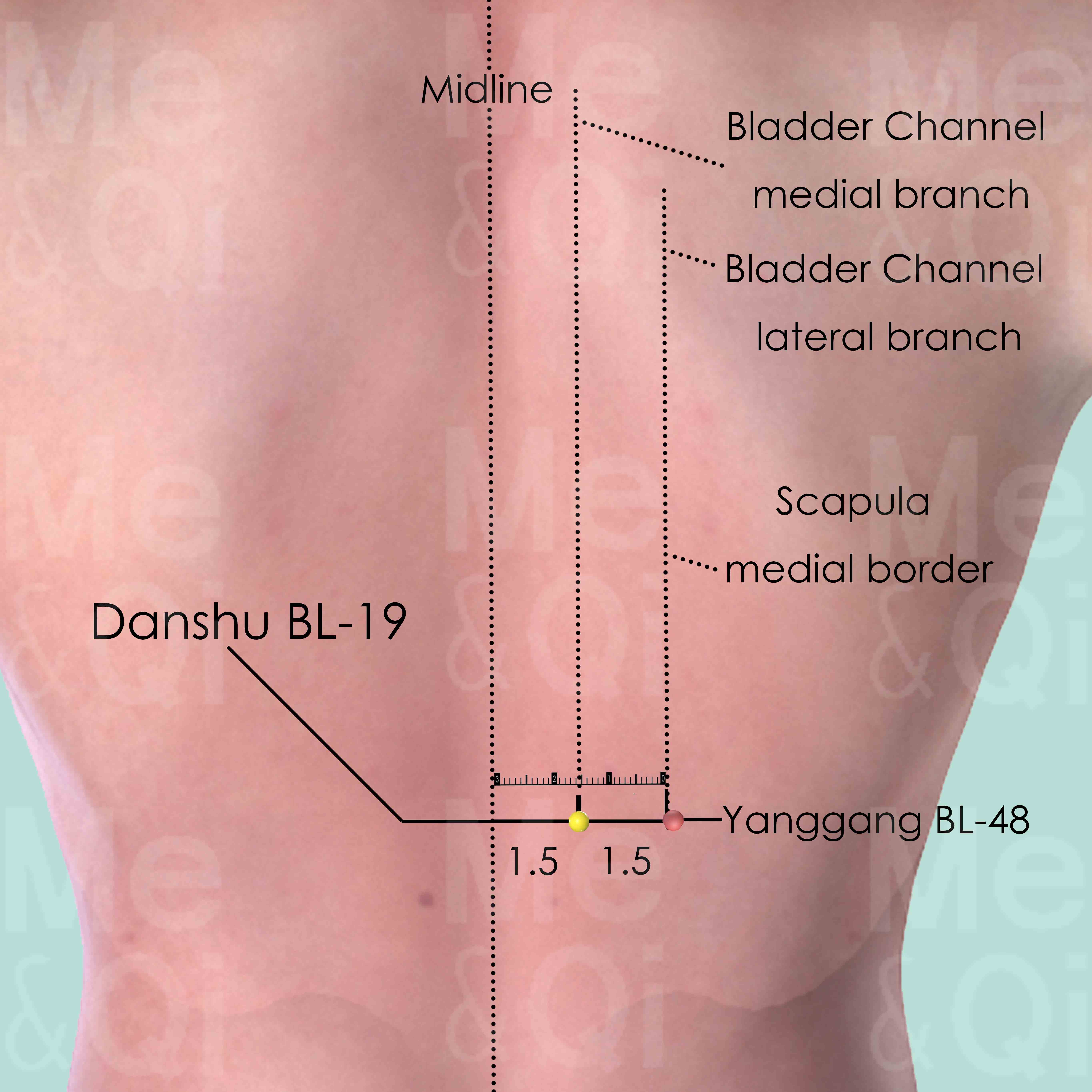
Danshu BL-19
1.5 cun lateral to the lower border of the spinous process of the 10th thoracic vertebra (T10).
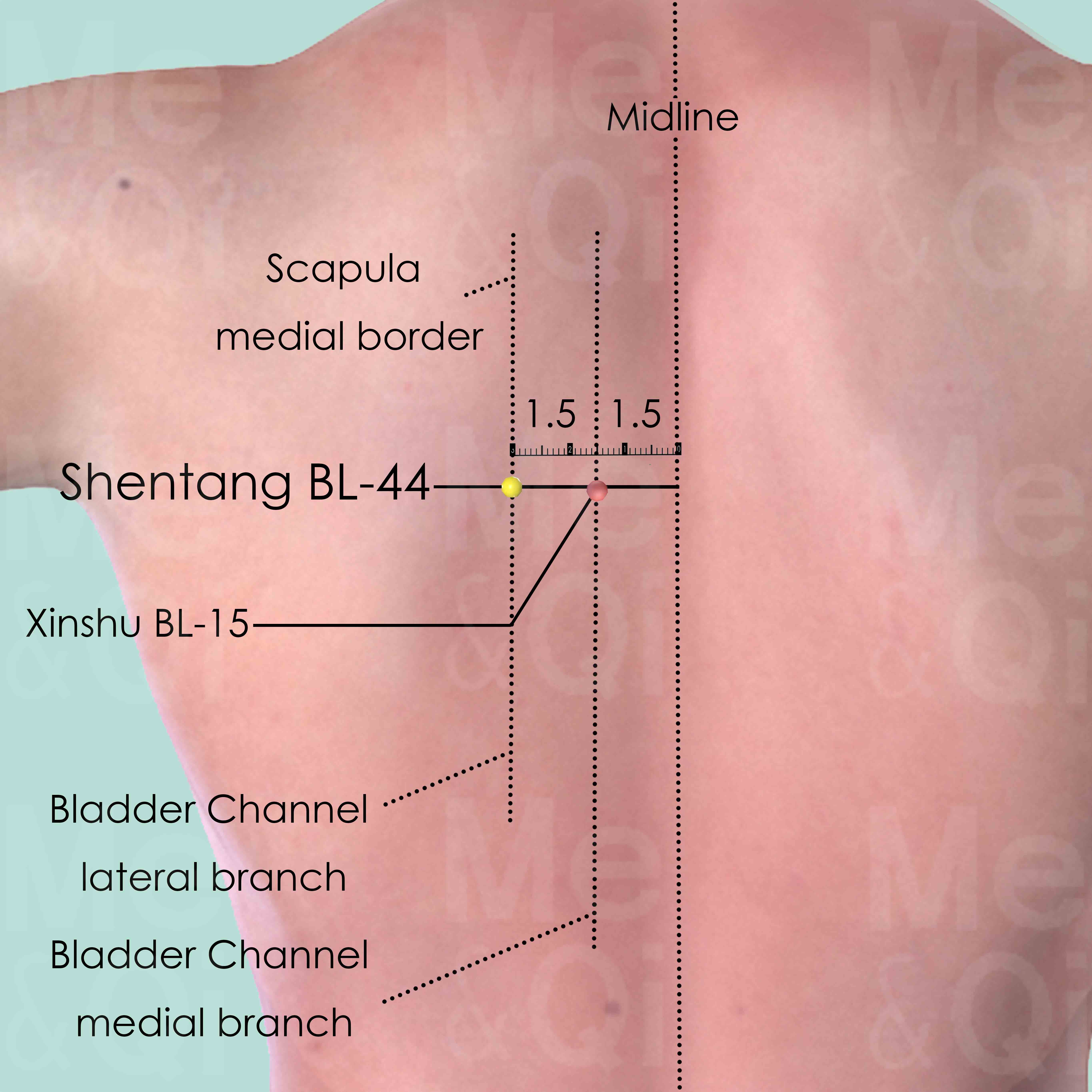
Shentang BL-44
3 cun (about 4 finger-breadths) lateral to the lower border of the spinous process of the 5th thoracic vertebra (T5).
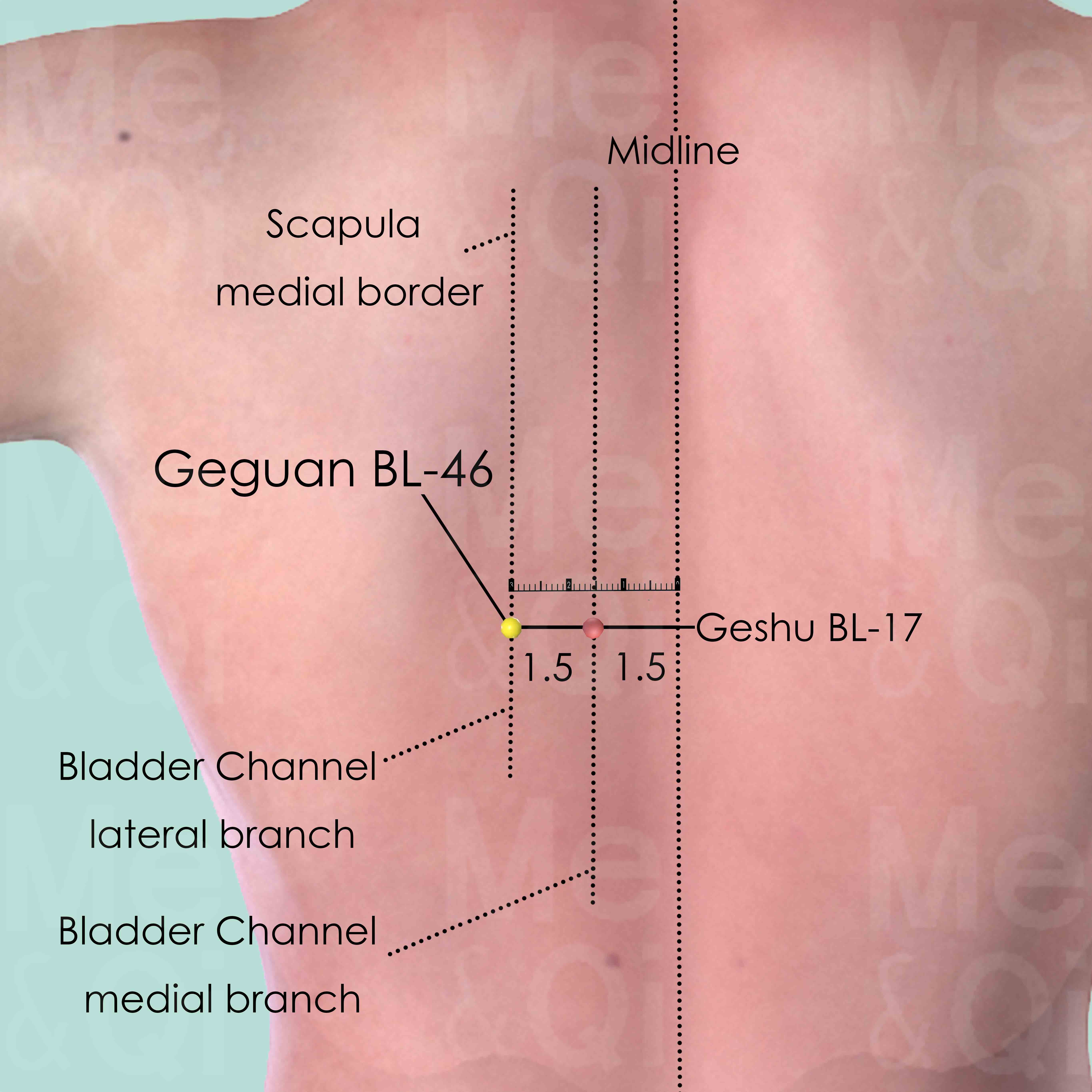
Geguan BL-46
3 cun (about 4 finger-breadths) lateral to the lower border of the spinous process of the 7th thoracic vertebra (T7).
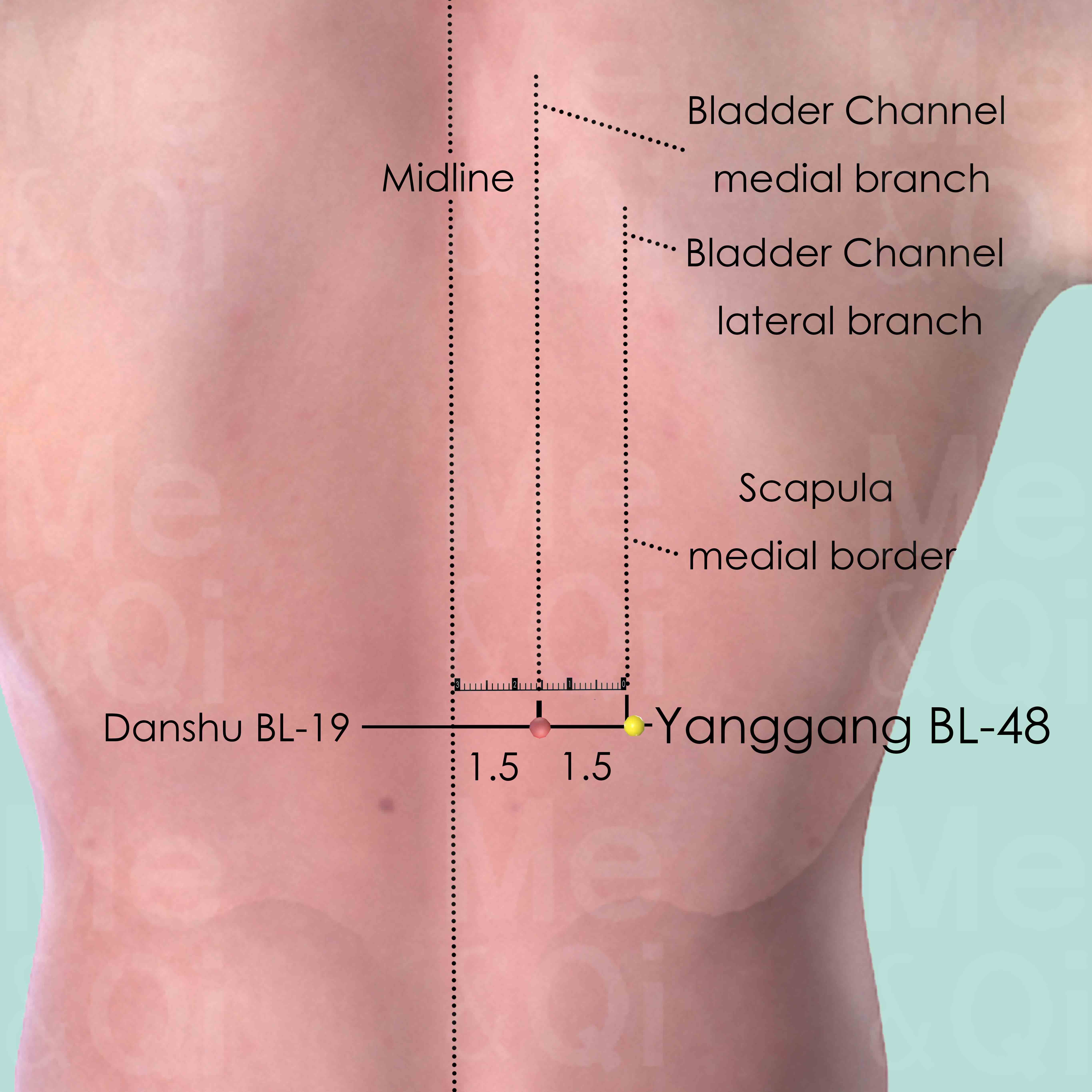
Yanggang BL-48
3 cun lateral to the lower border of the spinous process of the 10th thoracic vertebra (T10).
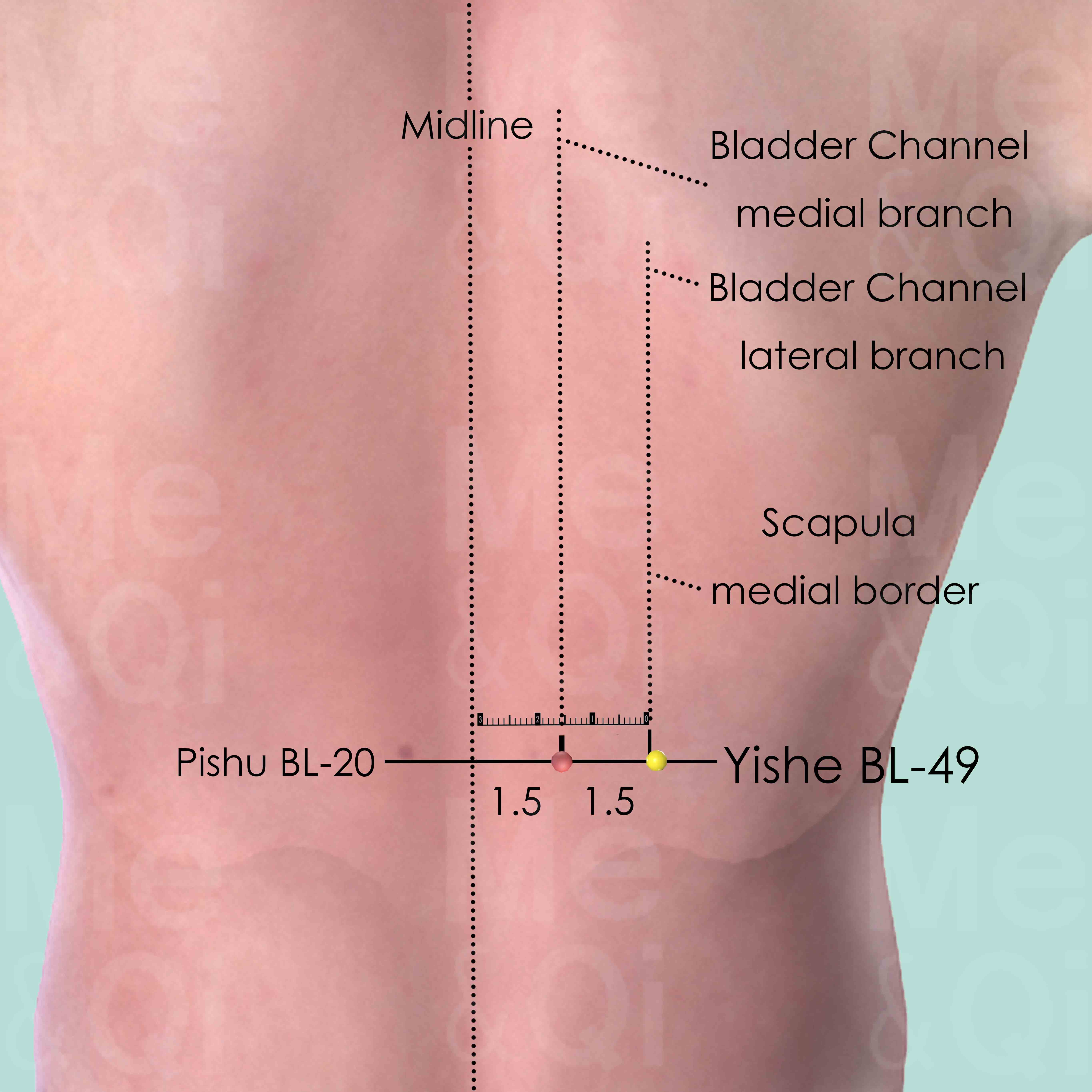
Yishe BL-49
3 cun lateral to the lower border of the spinous process of the 11th thoracic vertebra (T11).
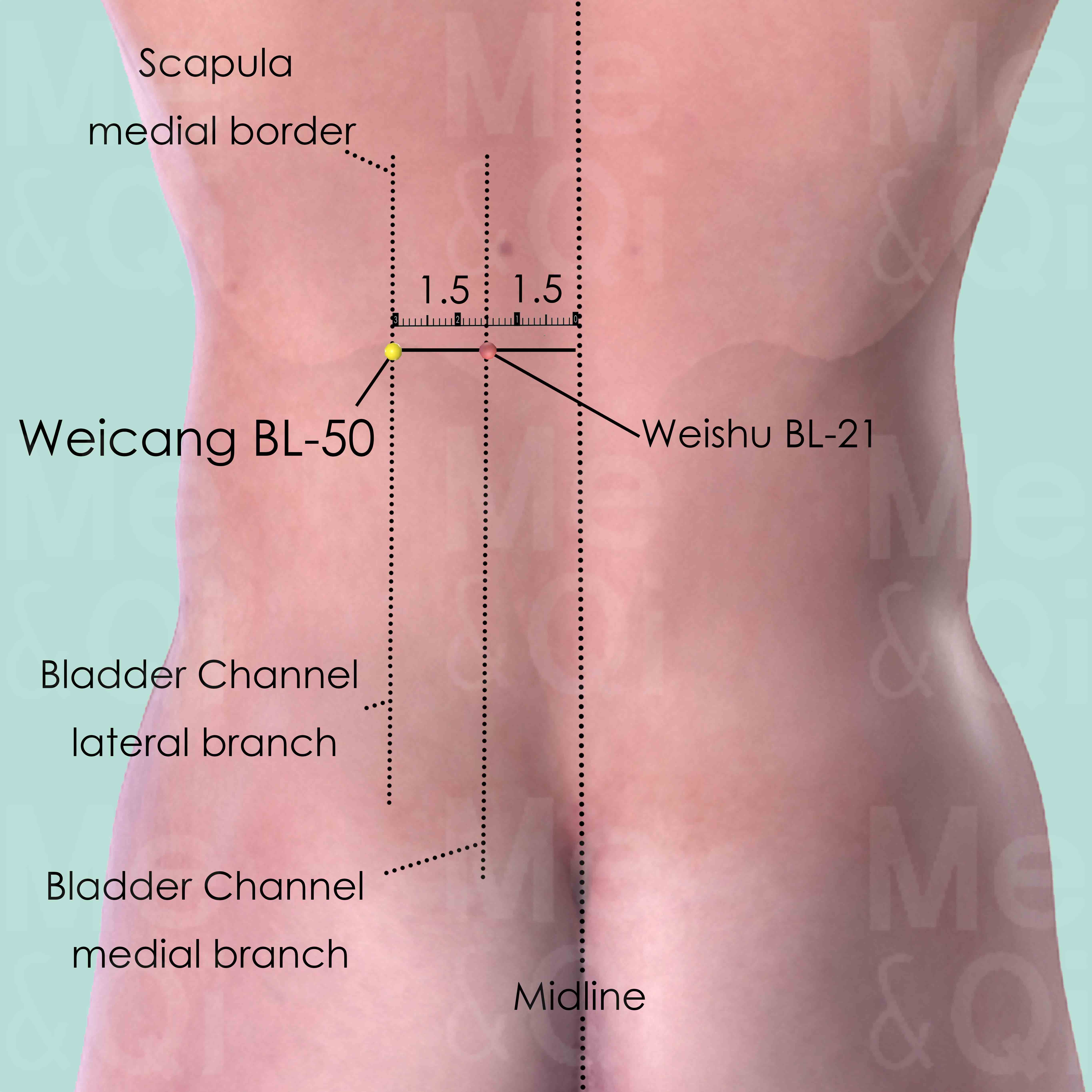
Weicang BL-50
3 cun lateral to the lower border of the spinous process of the 12th thoracic vertebra (T12).
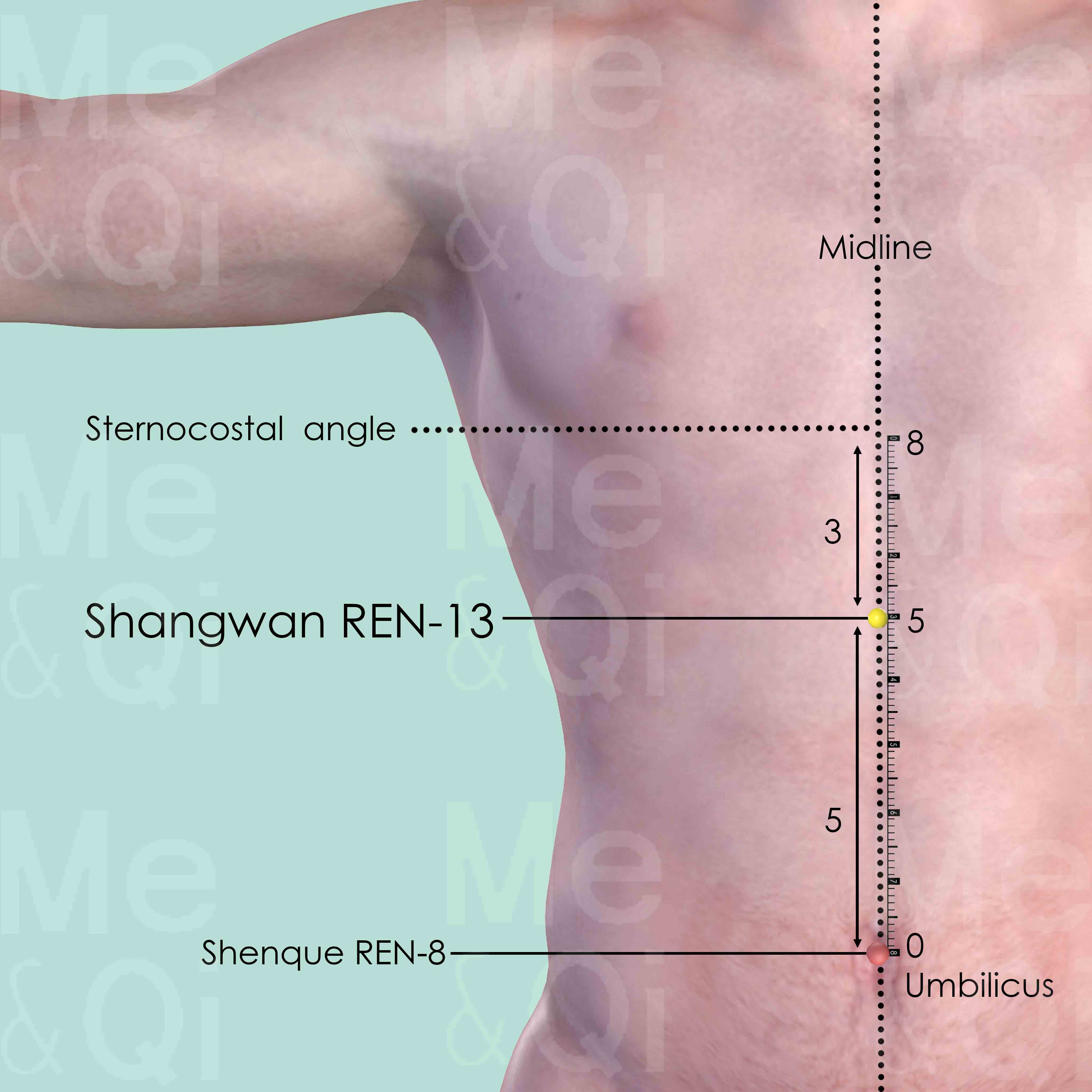
Shangwan REN-13
On the midline of the abdomen, 5 cun above the umbilicus and 3 cun below the sternocostal angle.
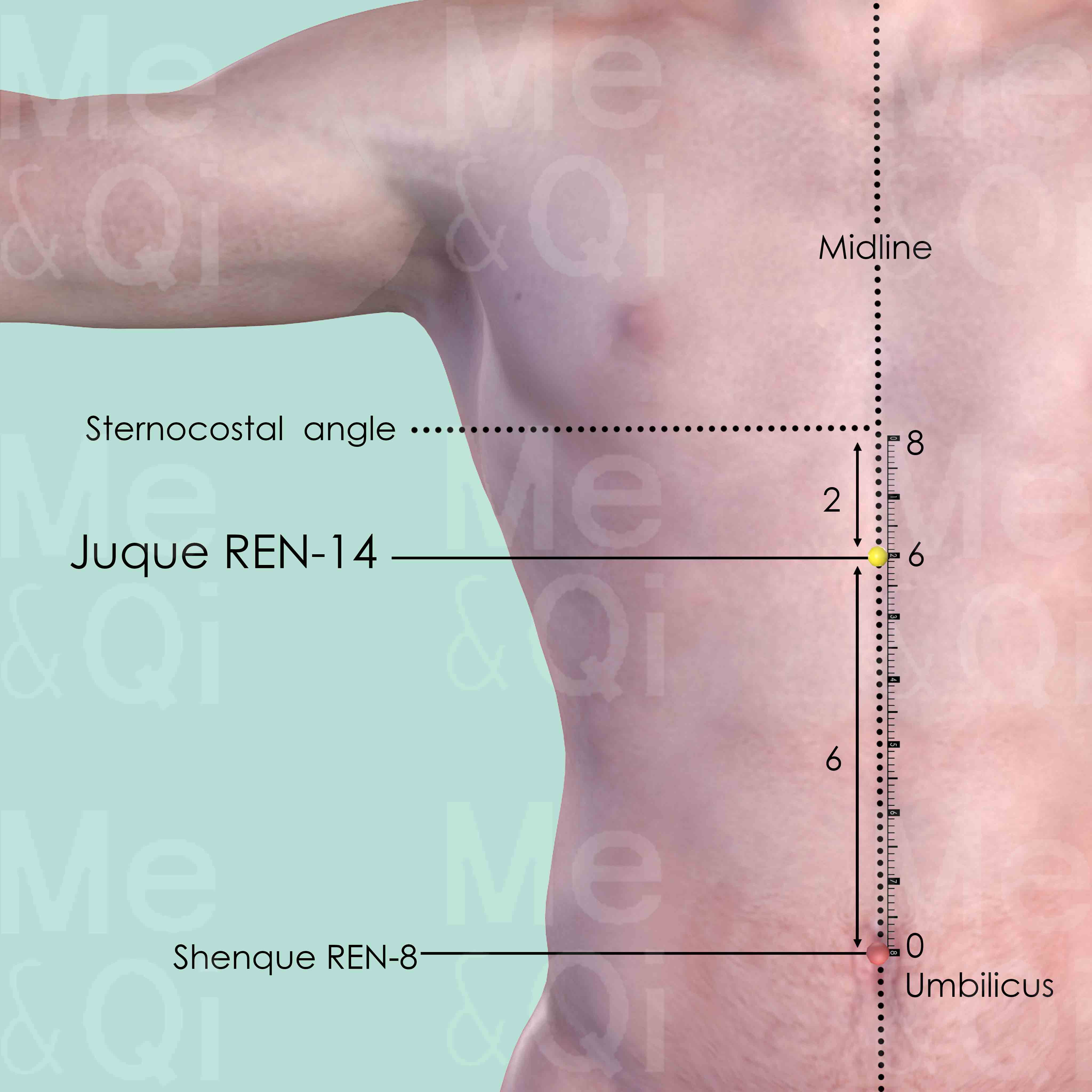
Juque REN-14
On the midline of the abdomen, 6 cun above the umbilicus and 2 cun below the sternocostal angle.
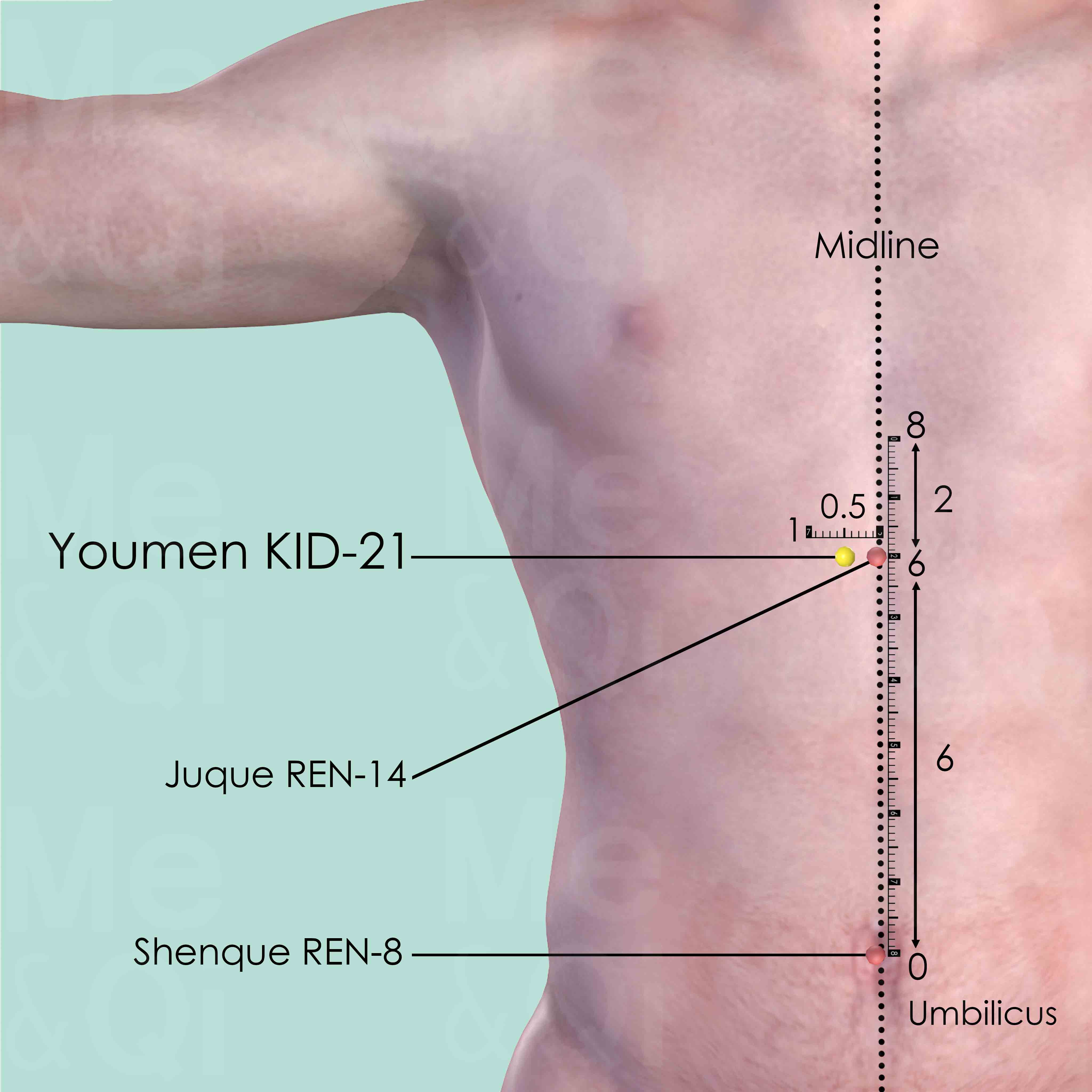
Youmen KID-21
6 cun above the umbilicus and 2 cun below the sternocostal angle, 0.5 cun lateral to the anterior midline.
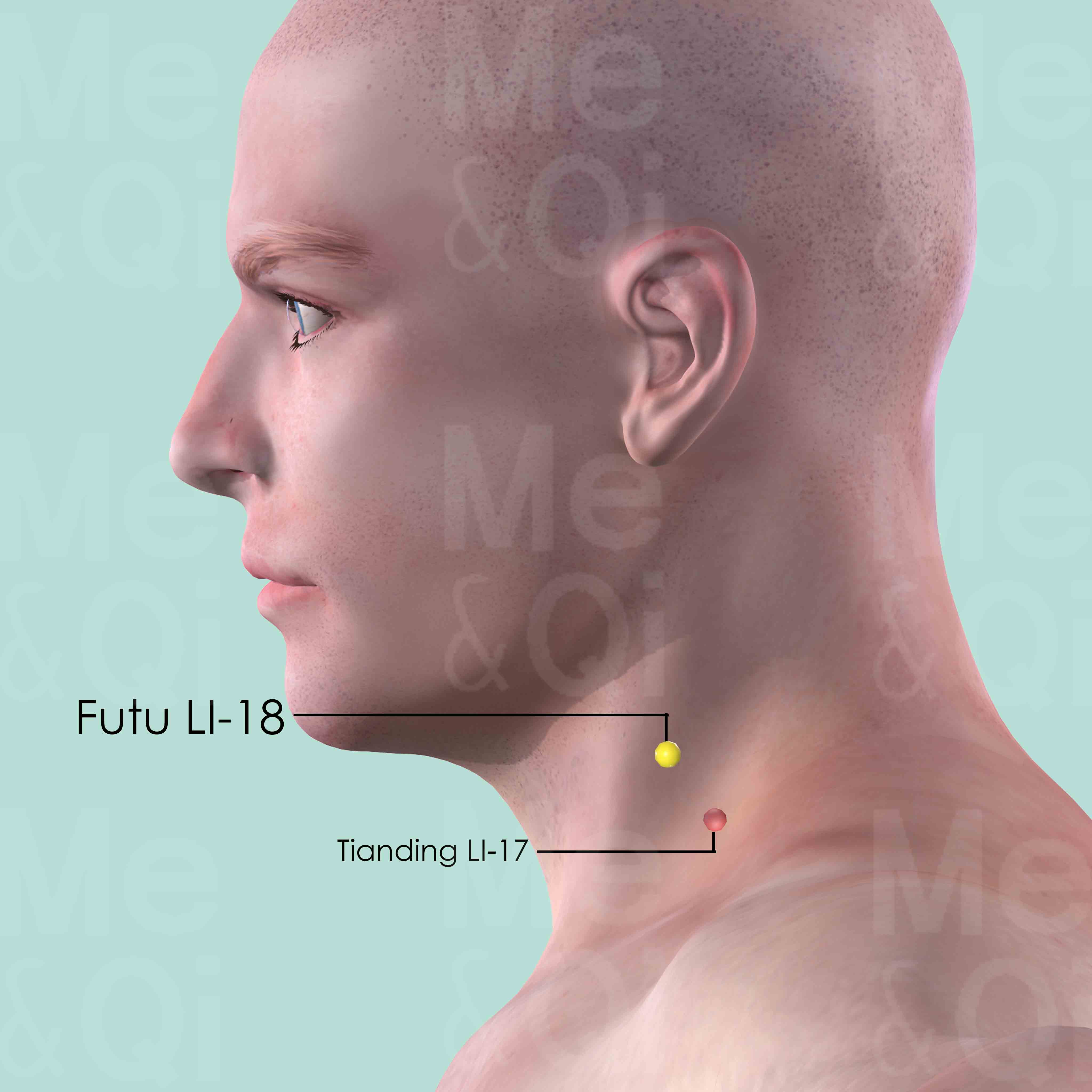
Futu LI-18
On the lateral side of the neck, level with the tip of Adam's apple, between the sternal head and clavicular head of sternocleidomastoid muscle.
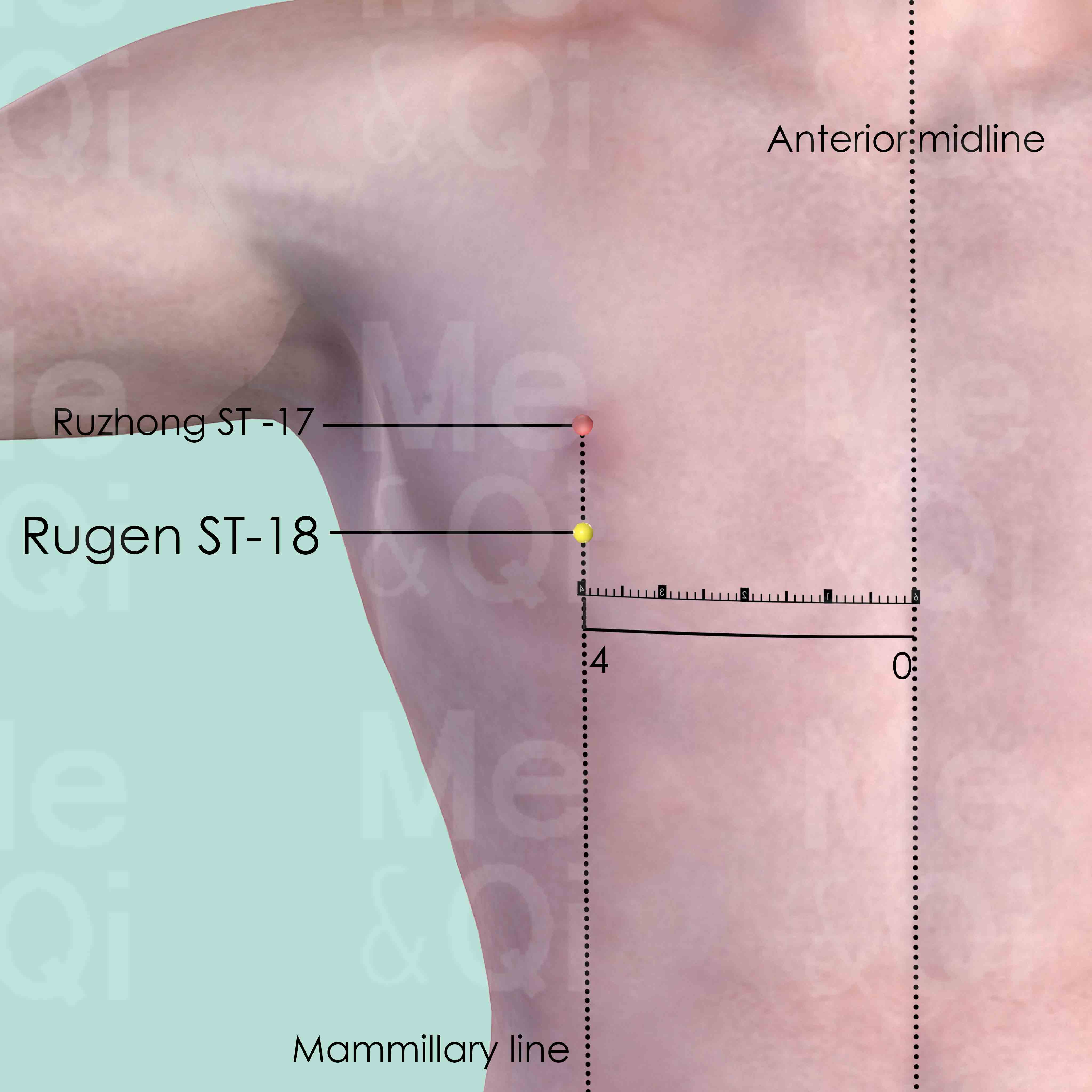
Rugen ST-18
In the 5nd intercostal space, on the mammillary line, 4 cun lateral to the anterior midline.

